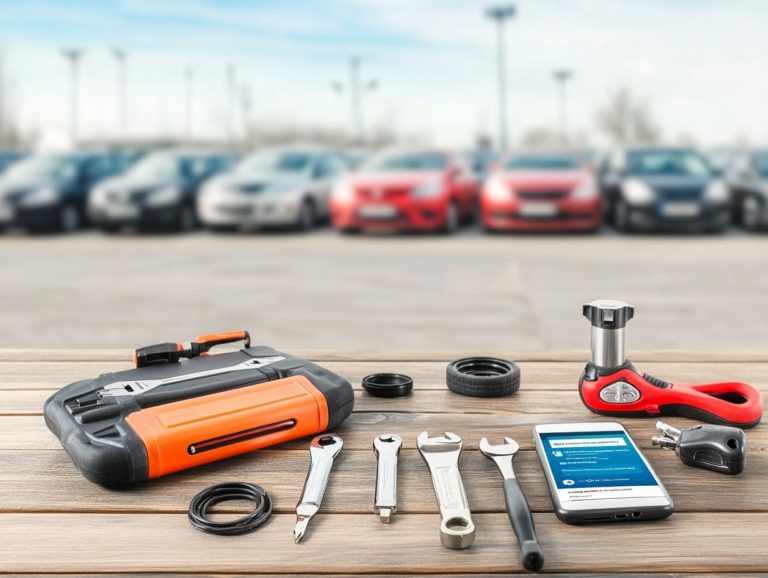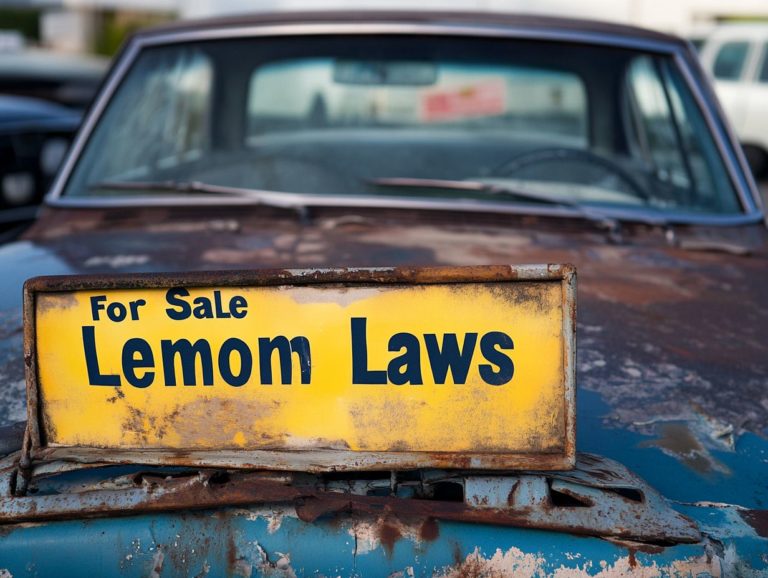Understanding Your Rights as a Used Car Buyer
Buying a used car can be an exhilarating yet overwhelming journey. With a plethora of options and a wide range of prices, it’s crucial for you to make an informed decision.
This guide will equip you with everything you need to navigate the process, from understanding your rights as a buyer to researching essential factors before you commit to a purchase.
It delves into the nuances of inspecting the vehicle, negotiating the best possible price, and successfully closing the deal. It also includes steps to resolve any problems you might face after buying.
Get ready to hit the road with confidence! Let s dive in!
Contents
- Key Takeaways:
- Know Your Rights as a Used Car Buyer
- Researching Before You Buy
- Inspecting the Used Car
- Negotiating the Price
- Finalizing the Purchase
- Dealing with Issues After the Purchase
- Frequently Asked Questions
- What are my rights as a used car buyer?
- What is the Lemon Law and how does it protect me?
- Can I return a used car if I am not satisfied with it?
- What should I do if I discover hidden defects after buying a used car?
- Do my rights as a used car buyer depend on where I buy the car?
- Can I negotiate the price of a used car based on its condition?
Key Takeaways:

Know your rights and protections as a used car buyer to avoid being taken advantage of.
Thoroughly research and inspect the car before making a purchase to ensure you are getting a good deal.
Be prepared to negotiate the price and make sure you have all necessary documents and paperwork before finalizing the purchase.
Why Buy a Used Car?
Buying a used car presents you with a world of advantages. You can enjoy affordability, experience lower depreciation, and explore a broader selection of vehicles tailored to your specific needs.
Whether that s a rugged truck for towing or a nimble compact car for zipping around the city, the options are vast.
By grasping the nuances of the used car market, you can make a wise investment and get the best financing deals.
As you consider the purchase of a pre-owned vehicle, you’ll discover that the savings can be quite significant. This allows you to allocate funds toward other essential expenses.
The variety in the used car market means there s an array of options to suit every preference, from eco-friendly models boasting remarkable fuel efficiency to spacious family-friendly SUVs designed for comfort.
Knowing how to get a vehicle history report can help you spot possible problems. This knowledge helps you navigate the buying process with greater confidence, ultimately saving you money in the long run.
Know Your Rights as a Used Car Buyer
Understanding your rights can make all the difference when buying a used car. It’s essential for you to know what to know about lemon laws in used cars to guarantee a fair and transparent transaction.
Federal laws protect your interests, like the Magnuson-Moss Warranty Act. These laws define expectations for dealer warranties and implied warranties, equipping you with the knowledge needed to expertly navigate the intricacies of the used car market.
With this understanding, you can approach your purchase with confidence.
Laws and Protections for Used Car Buyers
Laws and protections for used car buyers are crafted to ensure your safety and fairness in the marketplace. Regulations like lemon laws let you return defective vehicles.
By understanding these laws, along with the framework established by consumer protection agencies and the Consumer Rights Act 2015, you can make informed decisions and safeguard your investments.
Lemon laws let you return defective vehicles. Other laws also provide safeguards, such as warranties covering specific repairs and your right to full disclosure of a car’s history.
As you navigate this complex landscape, lean on consumer protection agencies dedicated to enforcing these regulations. These organizations help resolve disputes and educate you about your rights, fostering transparency and trust in the used car market.
Researching Before You Buy
Researching before purchasing a used car is crucial for making an informed decision. It enables you to assess potential options and uncover any significant issues tied to a specific model.
By leveraging resources like the vehicle identification number (VIN), you can obtain a detailed vehicle history report from reputable services such as Kelley Blue Book or Edmunds.
This will arm you with invaluable insights into the car s condition, its past ownership, and any reported accidents. You ll be well-prepared for your investment.
Next, we’ll explore how to research effectively.
Important Factors to Consider

When you re thinking about buying a used car, consider crucial factors. This will help ensure you make a wise investment.
One key consideration is the need for an independent inspection. An inspection confirms that the vehicle meets satisfactory quality standards.
Understanding the fair trade-in value can give you leverage during negotiations. It helps you assess the overall cost-effectiveness of your potential purchase.
A thorough inspection reveals hidden mechanical issues and provides reassurance about the car s history. This fosters peace of mind.
Working alongside a reputable mechanic brings to light critical aspects, such as the condition of the engine, brakes, and transmission. These elements are essential for determining the car s reliability.
Also, consider the vehicle s mileage, service records, and accident history. These factors significantly influence both the lifespan of the car and its projected maintenance costs.
Follow these steps to confidently dive into the used car market and discover your dream ride!
Inspecting the Used Car
Inspecting a used car is an essential step in your buying journey. It equips you to uncover any significant issues that might not be obvious at first glance.
Engaging an independent inspection, preferably conducted by a qualified mechanic, offers a comprehensive assessment of the vehicle’s condition. Verify the presence of an inspection sticker and check that dealer warranties are valid. This safeguards your investment and provides peace of mind.
What to Look for During an Inspection
When inspecting a used car, focus on several key aspects, particularly major issues like engine problems or transmission failures. These can significantly impact the vehicle’s longevity and performance.
An independent inspection, combined with a vehicle history report, serves as critical tools. They ensure that the vehicle meets satisfactory quality standards and represents a sound investment.
As you evaluate a used car, it’s crucial to pay close attention to the condition of essential components. Check the brakes, tires, and suspension, all of which are vital for safe driving.
Make sure to look for signs of rust, leaks, or any history of accidents. These could compromise safety and reliability.
Additionally, assess the interior for wear and tear. Examine all features and systems for functionality, and review maintenance records for deeper insights into the vehicle s overall condition.
Opting for an independent inspection not only grants peace of mind but may also uncover issues that aren t immediately visible. This ultimately shields you from costly repairs down the line.
Negotiating the Price
Negotiating the price of a used car is a pivotal moment that can greatly impact the total cost of your purchase. Understanding your financing rights equips you with the confidence needed to engage in this process.
Establish a fair trade-in value and utilize an auto loan calculator. These steps provide valuable insights that enable you to navigate dealer warranties and negotiate with finesse. This ensures you secure the best possible deal.
Tips for Getting the Best Deal
To secure the best deal on a used car, leverage your financing rights while engaging with the dealer. Familiarize yourself with consumer education resources and understand the importance of dealer warranties. This will enable you to advocate effectively for a fair trade-in value, resulting in a more advantageous purchase agreement.
Conduct thorough research before your visit. Compare prices and gather insights on market trends, enabling you to speak with confidence during negotiations.
Knowing your credit score can significantly strengthen your position when discussing financing options. It’s crucial to scrutinize the fine print in financing agreements to understand any applicable fees. This way, you won t be caught off guard later.
Dealer warranties can provide peace of mind by covering essential components of the vehicle. Highlighting these aspects in your discussions can lead to substantial savings and foster a more robust negotiating environment.
Finalizing the Purchase

Finalizing the purchase of a used car requires careful attention to key documents. Ensure everything meets legal regulations.
Check the vehicle identification number (VIN), sales contract, and proof of financing.
Don’t overlook warranty details. This can protect your investment long after the sale.
Important Documents and Paperwork
When finalizing your purchase, carefully review and sign vital documents. This includes the sales contract, financing agreements, and VIN documentation.
Knowing your financing rights and dealer warranty specifics will help protect your investment.
In addition, ensure you receive the title transfer to confirm ownership. Proof of insurance is often required before driving off the lot.
The VIN is crucial. It tracks the vehicle’s history and reveals any past accidents that might affect its value.
Be aware of your rights regarding financing terms and any implied warranties. This will enhance transaction security.
Having all paperwork in order not only aids in a smooth sale but also empowers you with knowledge and protection.
Dealing with Issues After the Purchase
Tackling issues after buying a used car can be challenging. However, by following the right steps, you can effectively manage any problems.
Get familiar with lemon laws, dealer warranties, and consumer protection agencies. These resources provide essential support for post-purchase challenges.
Steps to Take if Problems Arise
If you face issues after your purchase, act quickly. Start by learning about your rights under lemon laws and dealer warranties.
Contacting consumer protection agencies can be invaluable for resolving disputes and ensuring your warranty is honored.
Document everything related to your purchase, including contracts and warranty details. Keep records of all communication with the dealer and repair services.
If your vehicle qualifies under lemon law, notify the dealer in writing after multiple failed repairs.
Understanding consumer protection agencies can shift the balance in your favor. They often mediate between buyers and sellers.
Remember, dealer and implied warranties add an extra layer of protection, especially when disputing claims about your vehicle’s condition.
Frequently Asked Questions
What are my rights as a used car buyer?

As a used car buyer, you have rights to truthful information about the vehicle. This includes its history, known defects, and any warranties provided by the seller.
What is the Lemon Law and how does it protect me?
The Lemon Law protects consumers from defective vehicles. If you buy a used car with major defects affecting safety or usability, you can return it for a refund or replacement within a specific timeframe.
Can I return a used car if I am not satisfied with it?
It depends on your purchase agreement. Some dealerships have return policies, but they’re not legally required. If the car is sold “as is,” returning it may be difficult.
If you find hidden defects or damages after buying a used car, you could have a strong case for fraud. Contact the seller to negotiate a refund or repairs right away.
Do my rights as a used car buyer depend on where I buy the car?
Yes, your rights change based on whether you buy from a private seller or a dealership. Private sales usually don t come with warranties (promises to fix certain issues) or return policies (options to bring the car back under specific conditions), while dealerships must disclose any known defects.
Can I negotiate the price of a used car based on its condition?
Absolutely! If the car has visible damages or defects, you can negotiate for a lower price. Thoroughly inspect the car and do your research to ensure you get a fair deal!






